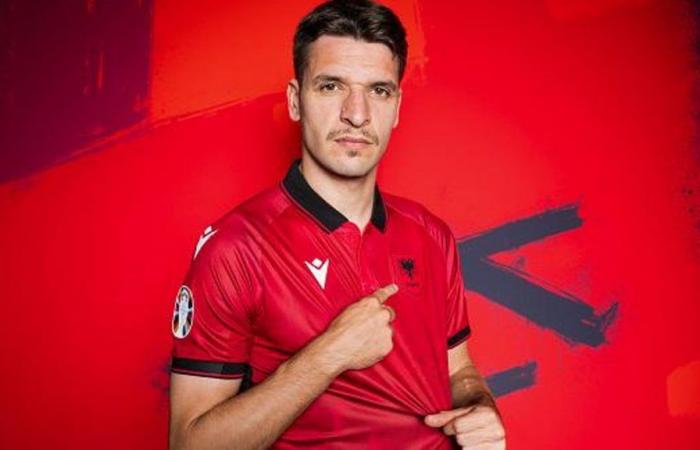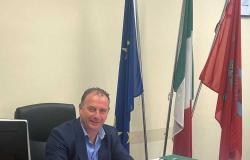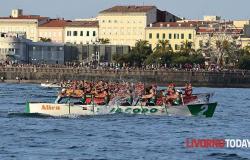
DORTMUND – On a wall of the coach’s office Sylvinho, in the sports center of the football federation of Tirana, there are long lists of names of footballers divided by position. Every now and then one of those ends up inside a red circle and becomes an Albanian international, even if perhaps he never imagined he would be one again.
The last case is that of Jasir Asaniright winger, born in Macedonia and discovered in South Korea, in Gwangju: here in Dortmund he will be the direct opponent of Marco’s.
Nineteen out of 26 Albanians were born abroad
Albania is a widespread nationality, the product of a scattered population, even if no longer scattered. Nineteen of the 26 members of the squad, including the Veronese Kumbulla from Peschiera del Garda, were born abroad, almost all children of the migratory wave of the nineties. Not though Strakoshaborn in Athens because his father Photoalso a goalkeeper, played for fifteen years in Greece. Others instead emigrated as children or very young (the “Tuscans” Hysaj And Asllani) and no one chose to play for Albania out of convenience, preferring a place in the sun in a less competitive national team to waiting, perhaps in vain, for a call from the representative of the country of origin. Some played for youth in their second homeland (Bajrami defended the colors of Switzerland up to the Under 21 level) but then preferred to represent their roots. Others had to make difficult choices, especially those with Kosovan origins, such as Ismajli which has long been disputed between the two national teams.
Djimsiti: “Even abroad we grow with Albanian culture”
But the common trait is that Albanians from all over the world, when they meet, become their homeland, as Captain Djimsiti says: “Even if we were born abroad, we live in Albanian, or Kosovan, homes, where Albanian is spoken and we grow up with the traditions Albanians. When it comes to deciding, the choice is easy.”
From De Biasi and Sylvinho, this is how Albania finds emigrants
With Sylvinho, but also before with Reja and Panucci ct, the Albanian federation has developed a sophisticated system for monitoring footballers of Albanian origins around the world (those who then end up on the list on the wall), in order to broaden the base (not very vast) from which to select the national players: it is the modernization of the artisanal method introduced by Gianni De Biasi, the first coach to truly change the social status of Albanian football, bringing it to high levels of competitiveness. He looked through almanacs and scoresheets, now there are offices abroad or otherwise he searches with the software in the minor leagues and in those outside Europe, finding players who Sylvinho and his collaborators study the video for a long time, trying to understand if they can be useful to the team. It happened with Asani.
In Dortmund at least forty thousand Albanians
Albania is a traveling homeland. These days Albania is Dortmund, where at least they will be at the match 40 thousand emigrantsand not only in Germany: they will be double the number of Azzurri fans (but it is feared that the proportions will be much more disadvantageous for us, all things considered) and they will only occupy a small portion of the monumental “yellow wall” that characterizes the fabulous Borussia stadium .
The blue wall risks fading into the Albanian red and black, which yesterday was already the most striking color in the city centre. On the other hand, many remember that we also played “away from home” the penultimate time we challenged Albania at home, in 2014 in Genoa: at Marassi, that evening, the tricolor was a minority. “We know that the world is full of Albanians”, he was almost emotional Sylvinho on the eve, “and it is an incredible responsibility to represent all these people. It will be exciting to have such a large stadium, full of our compatriots.”
Ties with Italy
However, there is no hatred or animosity. Not among the fans, because in general the Albanian people are grateful to us, and even less among the players, given that nine of those who are here play in Serie A, one in Serie B and three others have played there in the past . On the other hand, the Albanian footballers spread across the Italian leagues were, in the last season, 341, fewer only than the Argentines (436). And only in Germany are there more (436). Italian is the language with which Sylvinho and the team communicate, it is the language with which the coach held (brilliantly) the press conference on the eve of the match together with the captain Djimsiti who for his part also speaks German and English perfectly.
The Djimsiti-Scamacca challenge
The wandering national team is a dangerous team, with very solid technical and tactical values. He knows everything about us (but we know a lot about them) and Sylvinho confessed a week ago that he had nothing else on his mind: “I thought about Italy even while I was sleeping.” Sylvinho he was Mancini’s deputy at Inter (“But I haven’t heard from Roberto for six months”), but he believes that “between the European champions of Italy and this Spalletti there are no major differences in values. You are a very strong team who came here to win the title.” For Albania, who had the misfortune of ending up in a very complicated group, it would be enough to get through for the first time in history and after the mockery of France 2018, when De Biasi missed out on the round of 16 due to a series of cursed coincidences. They don’t feel beaten, far from it. “This match can give us a boost of self-esteem,” assures Djimsiti, who will have the task of marking his clubmate Scamacca: who knows which of the two will be more indigestible than the other. “I know him very well, we celebrated the Europa League together, but we never talked about this match.” Neither in Italian nor in any other language.





